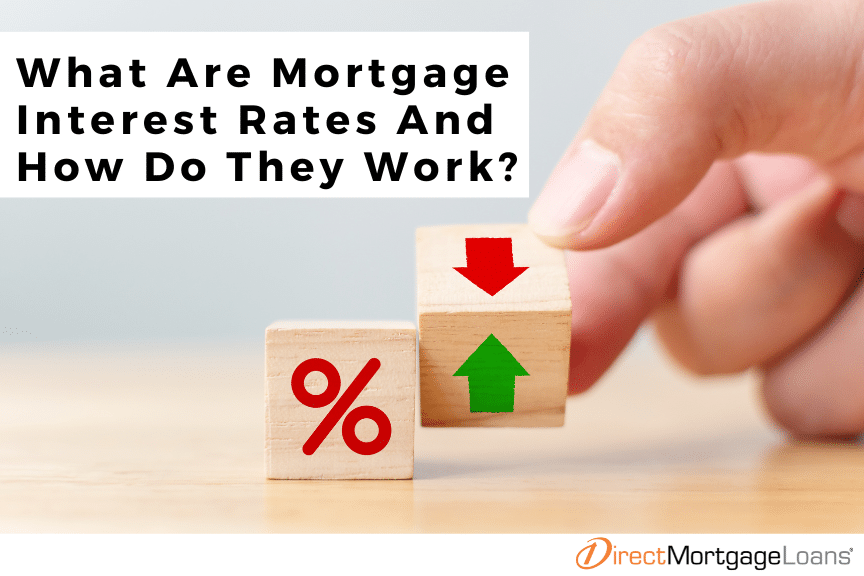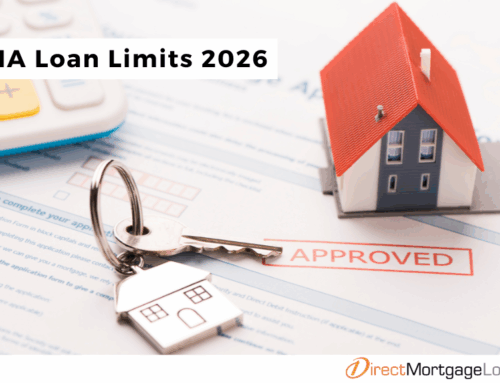When buying a home or refinancing, mortgage interest rates play a crucial role in determining how much you’ll pay overtime. These rates directly affect your monthly payment, loan affordability, and the total interest cost throughout your loan term. Whether you’re a first-time homebuyer or considering refinancing, understanding how interest rates work can help you make informed financial decisions.
Subscribe to our blog to receive notifications of posts that interest you!
What is mortgage interest?
Mortgage interest is the cost charged by a lender for borrowing money to buy a home. Expressed as a percentage of the loan amount, it is a key component of your monthly mortgage payment.
When you take out a mortgage, you agree to repay both the principal (the amount borrowed) and the interest (the lender’s fee for lending you money). The interest rate you receive influences how much you will ultimately pay for your home over the loan’s lifetime. Interest rates are applied annually, which is why you may see terms like Annual Percentage Rate (APR) or Annual Interest Rate when reviewing loan offers.
How do mortgage interest rates work?
Mortgage interest rates determine how much you pay to borrow money for a home. They are influenced by market conditions, the lender’s assessment of your financial profile, and the type of loan you choose. Fixed rate mortgages provide consistent monthly payments, while adjustable rate mortgages may change over time based on economic factors. Understanding how these rates function can help you make informed decisions about your home loan.
What are the different types of mortgage interest rates?
There are two primary types of mortgage interest rates: fixed-rate and adjustable-rate mortgages. Each type has its own advantages and disadvantages, and the right choice depends on your financial goals, risk tolerance, and how long you plan to stay in your home.
Fixed Rate Mortgage
A fixed-rate mortgage maintains the same interest rate for the entire loan term. The key benefits of this type of loan include:
- Predictability: Your monthly principal and interest payments remain the same.
- Long-Term Stability: Ideal for homeowners planning to stay in the same home for many years.
- Protection from Market Fluctuations: Even if interest rates rise in the future, your rate remains locked.
Fixed-rate loans are typically available in 15-year, 20-year, or 30-year terms, with 30-year mortgages being the most common.
Adjustable Rate Mortgage (ARM)
An adjustable-rate mortgage (ARM) features a fixed interest rate for an initial period (e.g., 5, 7, or 10 years), after which the rate adjusts periodically. The main features of ARMs include:
- Lower Initial Rates: Generally lower than fixed-rate mortgages at the start.
- Market Dependency: Rates adjust based on a financial index, meaning payments may rise or fall.
- Risk & Reward: While lower initial payments can be attractive, the risk of future rate increases can make budgeting challenging.
Talking to a mortgage professional at Direct Mortgage Loans could help you understand what loan and rate options are available.
What is an annual percentage rate?
When comparing mortgage loans, you may come across the term Annual Percentage Rate (APR). This figure provides a more complete picture of the total cost of borrowing by incorporating both the interest rate and any additional lender fees.
The Annual Percentage Rate (APR) represents the true cost of borrowing, including both the interest rate and additional loan fees. APR helps you compare different mortgage offers more accurately since it accounts for lender fees, discount points, and other costs.
For example, a mortgage with a 5% interest rate and minimal fees may have a lower APR than a loan with a 4.75% interest rate but higher closing costs.
How are mortgage interest rates determined?
Mortgage interest rates are influenced by a combination of macroeconomic factors and individual borrower qualifications. Understanding these factors could help you anticipate changes in rates and secure a favorable loan.
Several economic and personal factors influence mortgage interest rates:
- Economic Conditions: Inflation, employment rates, and Federal Reserve policies impact rates.
- Loan Type & Term: Different mortgage products (e.g., conventional vs. FHA) have different rate structures.
- Borrower’s Credit Score: Higher credit scores generally lead to lower interest rates.
- Loan Amount & Down Payment: A higher down payment often results in a lower interest rate.
What affects the mortgage interest rates?
While many factors play a role in determining mortgage interest rates, the biggest influences come from government monetary policies, market conditions, and personal financial profiles. Knowing what impacts your rate could help you make informed decisions when applying for a mortgage.
- Federal Reserve Decisions: The Federal Reserve influences short-term interest rates, indirectly affecting mortgage rates.
- Lender Risk Assessment: Borrowers with lower credit scores or higher debt levels often receive higher rates.
- Loan-to-Value Ratio (LTV): A lower LTV (larger down payment) leads to better interest rates.
How do you calculate interest rate on a mortgage?
Understanding how mortgage interest is calculated can help you better manage your loan and budget accordingly. Interest calculations typically follow an amortization schedule, which determines how much of each payment goes toward interest and how much toward principal.
Mortgage interest is calculated using an amortization schedule, meaning you pay more interest in the early years and gradually pay more toward the principal. Online mortgage calculators can help estimate monthly payments based on interest rates, loan amounts, and terms.
Consult with an expert like the ones at Direct Mortgage Loans to get an accurate understanding on what your mortgage payment will look like with current rates.
How Mortgage Interest Rates Affect Monthly Payments
Mortgage interest rates directly impact the amount you pay each month. Even a slight change in the interest rate can make a significant difference in affordability. Higher rates mean larger monthly payments, while lower rates can make homeownership more accessible. Understanding how this works can help you plan your budget effectively.
Example:
Let’s consider an FHA loan for a home purchase of $300,000. FHA loans typically require a minimum credit score of 580 to qualify for the 3.5% down payment option, though some lenders may have higher requirements.
- With a 3.5% down payment, the borrower puts down $10,500, leaving a loan balance of $289,500.
- With an interest rate of 4% and good credit, the monthly principal and interest payment would be approximately $1,381.
- If the interest rate rises to 5%, the monthly payment increases to $1,554, a difference of $173 per month or $62,280 over 30 years.
- If the rate drops to 3%, the monthly payment would decrease to $1,220, saving $161 per month or $57,960 over the loan’s lifetime.
- FHA loans also include mortgage insurance premiums (MIP), which must be factored into the total monthly cost. This example highlights how credit score and interest rate fluctuations impact mortgage affordability.
How to Lock in a Mortgage Interest Rate
When mortgage interest rates fluctuate, locking in your rate at the right time could protect you from potential increases. A mortgage rate lock ensures that the agreed-upon rate remains the same until your loan closes, regardless of market changes. Knowing when and how to lock in your rate could save you money and provide peace of mind during the homebuying process. Exploring all of your options is critical in determining if you can lock your mortgage interest rate. Direct Mortgage Loans can introduce you to the best options for your homebuying journey. Speaking with a loan officer will help you get started.
How To Get A Lower Interest Rate On Mortgage
Securing a lower mortgage interest rate could save you thousands of dollars over the life of your loan. Here are some strategies to help you qualify for the best possible rate.
Larger Down Payment
A larger down payment reduces the amount you need to borrow, which lowers the lender’s risk. Many lenders offer better interest rates to borrowers who put down at least 20% of the home’s purchase price. Additionally, a higher down payment helps you avoid private mortgage insurance (PMI), which could save you even more money over time.
Increase Your Credit Score
Your credit score is one of the biggest factors that affect your mortgage rate. To improve your score, pay down existing debt, make on-time payments, and avoid opening new credit lines before applying for a mortgage. A higher credit score signals to lenders that you are a responsible borrower, making you eligible for lower interest rates.
Increase Your Debt-to-Income Ratio
Your debt-to-income (DTI) ratio measures how much of your income goes toward debt payments. Lenders prefer borrowers with a lower DTI because it indicates financial stability. To lower your DTI, focus on paying down outstanding loans, avoiding new debts, and increasing your income if possible.
Compare Mortgage Loans
Ensure you understand all the types of loans and loan products you have available to you. Get quotes for each type you are eligible for, compare their terms, and consider working with a mortgage broker who can help you find the most competitive rate. Even a small difference in rates could lead to significant savings over the life of your loan. However, rates are not everything. Working with a lender that is communicative, personal, and has your best interest in mind is just as important. Working with Direct Mortgage Loans will allow you to access a lender that carries all of these traits.
Mortgage Interest Rate Trends Over The Years
Mortgage interest rates have fluctuated over time due to various economic factors, including inflation, changes in the housing market, and monetary policies set by the Federal Reserve. While rates have historically seen both highs and lows, they generally follow economic cycles. Understanding these trends can help homebuyers and refinancers make informed decisions about when to lock in their rates.
For example, during economic downturns, interest rates tend to be lower as the Federal Reserve attempts to stimulate borrowing and spending. Conversely, in times of strong economic growth, interest rates may rise to curb inflation. By analyzing past trends and market conditions, borrowers can better time their mortgage applications to secure the most favorable rates.
FAQ’s About Mortgage Interest Rates
Many homebuyers have questions about how mortgage interest rates work and how they impact home loans. Below are some of the most commonly asked questions to help you navigate the mortgage process.
Is it worth paying points to lower interest rates?
Paying discount points allows borrowers to reduce their mortgage interest rate by prepaying some of the interest upfront. This could be a good option if you plan to stay in your home long-term, as the savings on monthly payments over time can outweigh the initial cost. However, if you expect to move or refinance in the near future, the benefits may not be significant enough to justify the expense.
Can I buy down interest rate mortgage later?
Yes, borrowers could lower their interest rate later through refinancing or making additional principal payments*. Refinancing allows you to replace your current mortgage with a new one at a lower rate, which can reduce monthly payments and total interest costs. However, it involves closing costs, so it’s important to weigh the long-term savings against upfront fees.
Some lenders also offer loan recasting, where a lump sum payment is applied to reduce the loan balance and monthly payments without changing the interest rate. If you’re considering adjusting your rate, consult a lender to explore the best option based on your financial situation.
When will mortgage interest rates go down?
Mortgage rates fluctuate due to economic conditions, inflation, and Federal Reserve policies. While predicting exact rate movements is difficult, rates tend to drop during economic slowdowns as the government encourages borrowing. If you’re looking for a lower rate, monitoring trends and consulting with a lender can help you decide the right time to act.
Can you refinance if interest rates go down?
Yes, refinancing allows you to replace your existing mortgage with a new one at a lower interest rate, reducing your monthly payments and long-term interest costs. However, refinancing comes with closing costs, so it’s important to calculate whether the savings outweigh the upfront expenses before deciding.
How much does 1 percent interest rate affect mortgage payment?
Even a small change in interest rates can significantly impact monthly payments. For example, on a $300,000 FHA loan with a 30-year term:
- At an interest rate of 4%, the monthly principal and interest payment would be approximately $1,381.
- If the interest rate increases to 5%, the payment rises to $1,554, an increase of $173 per month or $62,280 over the life of the loan.
- If the rate decreases to 3%, the payment lowers to $1,220, saving $161 per month or $57,960 over the loan term.
Additionally, credit score plays a major role in determining the rate offered by lenders. Borrowers with a credit score of 580, the FHA’s minimum requirement, may receive a higher rate compared to those with a score of 700 or above, resulting in higher payments.
Will my mortgage go down if interest rates go down?
For borrowers with an adjustable-rate mortgage (ARM), monthly payments may decrease when interest rates fall. However, for fixed-rate mortgage holders, the only way to benefit from lower rates is through refinancing. Before refinancing, consider factors such as closing costs and how long you plan to stay in your home to determine if it’s financially beneficial. Consulting a knowledgeable lender like Direct Mortgage Loans will allow you to get all the information you will need to understand if you should refinance or not.
Rates are subject to change. Eligibility and approval are subject to completion of an application and verification of home ownership, occupancy, title, income, employment, credit, home value, collateral, and underwriting requirements. Direct Mortgage Loans, LLC NMLS ID# is 832799 (www.nmlsconsumeraccess.org). Direct Mortgage Loans, LLC office is located at 11011 McCormick Rd Suite 400 Hunt Valley, MD 21031. This is a paid endorsement. Equal housing lender.







Leave A Comment
You must be logged in to post a comment.